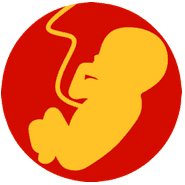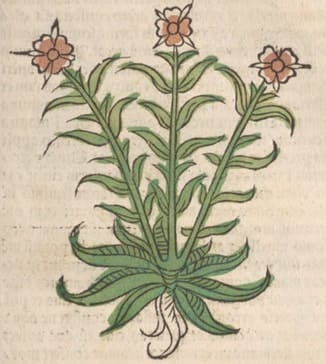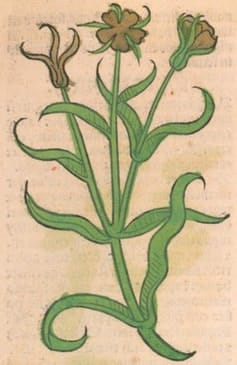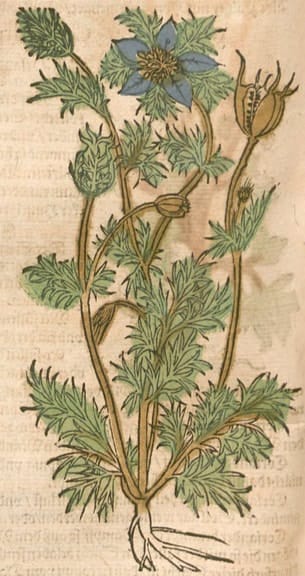Nigella, GithBlack Cumin, MelanthiumKalonji (Unani) Habat al-Baraka (Arabic) Kalajira, Mugrela (Ayurveda) Karuncirakam (Siddha) Zi ra nag po ཟི་ར་ནག་པོ (Tibetan) Hei Zhong Cao Zi 黑种草子 (TCM) |

|

|
 Herbarius latinus, Petri, 1485
Herbarius latinus, Petri, 1485 |
 Ortus Sanitatis, Meydenbach, 1491
Ortus Sanitatis, Meydenbach, 1491 |
 Krauterbuch, Lonitzer, 1578
Krauterbuch, Lonitzer, 1578Botanical name:
Nigella spp.
- N. sativa
- N. damascena
- N. glandulifera (syn. Nigella sativa var. hispidula)
Parts used:
Seed
Temperature & Taste:
Warm, dry, Pungent
“Black Cumin is Hot and Dry in the Third degree” (Avicenna)
Classifications:
2H. CARMINATIVE. 2K. RESOLVENT
3F. LITHONTRIPTIC. 3H. LACTAGOGUE. 3P. MASTICATORIES & STERNUTATORIES 3Q. ANTHELMINTIC
Uses:
1. Warms the Stomach, Moves Qi:
-cold and weak Stomach, Indigestion
-Colic, Bloating
-useful in Obesity
-as a spice and condiment to promote digestion
2. Warms Kidneys, Clears Damp, Promote Urine:
-Edema, Fluid retention from Cold Kidneys
-Urinary infection, Stones (TCM)
3. Warms the Lungs, Clears Phlegm:
-clears thick Phlegm from the Lungs: Cough, Bronchitis, Asthma, Catarrh
-a bag of the seeds smelled relieves Catarrh (Dioscorides)
4. Moves Qi, Promotes Menstruation:
-Amenorrhea (TCM, Ayurveda, West)
-it has been regarded as a Contraceptive (Duke)
-Promotes Labor
-“Its prolonged intake for several days with honey promotes menstrual flow” (Avicenna)
5. Promotes Milk
-promotes and enriches Breast Milk
6. Settles Wind, Clears Cold:
-Headache, Migraine
-Tinnitus, Forgetfulness (Uyghur)
-Hypotension
7. Resists Poison:
-cures venomous Bites; Dioscorides listed it for Spider Bite.
-specific in Quartan and Quotidian Ague
8. Kills Worms:
-traditionally used for Worms
9. Externally:
-Headache (plaster topically, Dioscorides)
-to dry Catarrh (by Sneezing, or as a Fume)
-topically for Toothache
-Lice and other Parasites
-Skin Spots and Birthmarks (applied with vinegar)
-Pityriasis, Leucoderma, Ringworm, Eczema, Freckles, applied with vinegar
-Leucoderma, apply essential oil topically
-Alopecia, applied with vinegar
-“It cleanses and removes inverted Warts, Freckles, Pityriasis and specially the (patches of) Leukoderma” (Avicenna)
-old swellings and hardness (applied with Vinegar, Dioscorides)
-Warts, applied with old urine after having been cut (Dioscorides)
-Essential oil is useful in Paralysis, Hemiplegia and Rheumatism
-“The smoke of Black Cuming drives out Insects” (Avicenna)
Dose:
Powder: 1–3 grams
Decoction: 3–9 grams; up to 20 grams in decoction for Dysmenorrhea
Corrective:
Tragacanth
Substitute:
1, Cumin
2. Aniseed or Fennel seed
Preparation:
1. Vinegar-prepared Nigella seed
The seed is sometimes steeped in Vinegar, then dried for use.
This is more penetrating, and better for removing obstructions. Avicenna recommended this as a snuff for Chronic Headache and Facial Paralysis.
Comment:
The prophet Muhammad recommended Nigella as a ‘cure-all’; it continues to be much used throughout the Muslim world.
Main Combinations:
1. Colic, gastrointestinal spasm and pain:
i. Nigella with Cumin, Caraway
ii. Nigella, Fennel, Long Pepper
2. Indigestion from Cold:
i. Nigella, Black Pepper and Salt as a condiment
ii. Nigella, Cumin
iii. Nigella, Ginger, Cinnamon, Clove
iv. Nigella, Plumbago, Fennel, Nutmeg, Licorice
3. Obesity, Nigella with Fennel, Celery seed, Ginger
4. Diarrhea from Cold and Damp:
i. Nigella, Fennel seed, Nutmeg, Galangal
ii. Nigella with Madder, Holarrhena
5. Cough with thick phlegm, Nigella with Tylophora, Long Pepper, Adhatoda
6. Edema from Cold and Damp:
i. Nigella with seeds of Parsley, Fennel, Celery, and Licorice root
ii. Nigella, Celery seed, Cinnamon
7. Strangury, Dysuria, Nigella seed, Dill seed, Parsley seed, Nasturtium seed (Herbarius latinus, Petri, 1485)
8. To promote Menstruation:
i. Nigella with Fennel seed, Pennyroyal
ii. Nigella seed with Butcher’s Broom root, Madder, Couch grass, Carrot seed, Mugwort, Marjoram (as in Syrup of Mugwort Lesser)
9. Uterine pain from Blood stagnation, Nigella with Bdellium, Myrrh, Turmeric
10. To promote Labor:
i. Nigella with Madder, Myrrh (as in Powder to Promote Birth)
ii. Nigella, Cinnamon, Saffron
11. Promote Breast Milk, Nigella with Pueraria tuberosa, Fennel seed, Asparagus racemosa
12. To benefit the Brain and Memory:
i. Nigella with Calamus and Frankincense
ii. Nigella with Calamus, Marjoram, Thyme, Stoechas, Clove, Cardamon, Orris (as in Powder to Strengthen the Memory)
13. Worms:
i. plaster Nigella on the navel of children for Worms (Dioscorides)
ii. Plaster of Nigella seed powder mixed with Wormwood juice, applied to the Umbilicus. (Herbarius latinus, Petri, 1485)
iii. Nigella with Wormseed, Cannabis seed, Wormwood, Thyme (as in Electuary Against Worms)
14. Toothache:
i. Nigella, Pyrethum decocted in vinegar as a mouthwash
ii. decoct Nigella with Pine wood and vinegar and use as a mouthwash. (Dioscorides)
15. Scabies, Itchiness:
i. Nigella with Sulphur, mixed with vinegar and oil to an ungent. (Herbarius latinus, Petri, 1485)
ii. boil Nigella powder in vinegar until thick, add oil of Walnuts and apply. (Secrets of Alexis)
16. Boils, Pimples and Spots on the Face:
i. mix the powder with Sesame oil and apply.
ii. mix powdered Nigella with Flour and Honey, form a paste and apply. (Secrets of Alexis)
Major Fomulas:
Powder to Promote Birth (Alexander)
Powder to Strengthen the Memory
Troches for Hardness of the Liver
Syrup of Mugwort (Augustana)
Syrup of Mugwort Lesser (Bononiense)
Electuary of Bayberries (Electuarium de Baccis Lauri)
Electuary Against Worms
Pills for Difficulty Breathing and Asthma
Catechu 25 (Seng ldeng 25) (Tibetan)
Pearl 25 (Mu tig nyer lnga) (Tibetan)
Wish-fulfilling Jewel (Bsam phel nor bu) (Tibetan)
Cautions:
1. Not used in medicinal doses during Pregnancy
2. Not used in Fever
Main Preparations used:
Seeds prepared (steeped overnight in Vinegar), Distilled Water and Distilled Oil of the Seeds
-
Extra Info
-
History
|
‘According to Birdwood, it is the Black Cummin of the Bible, the Melanthion of Hippocrates and Dioscorides, and the Gith of Pliny. Ainslie mentions its use as a carminative, also as an external application mixed with sesamum oil in skin eruptions; as a seasoning for food, and as a protection for linen against insects. Forskahl, in his Medicina Kaharina, says that it is a native of Egypt, where it is called Hab-es Souda. Roxburgh believes it to be a native of Hindostan. Anyhow, it must have been long known in India, as it has a Sanskrit name, Krishna jiraka. It is said to be cultivated in some parts of Gnzerat; but I have been unable to substantiate this statement. Nigella seed is extensively used as a spice and as a medicine. The Hakeems describe it as heating, attenuant, suppurative, detergent and diuretic, and consider that it increases the menstrual flow and the secretion of |
milk; also that it stimulates uterine action. They give it, too, as a stimulant in a variety of disorders which are ascribed to cold humors, and credit it with anthelmintic properties, It is sprinkled over the surface of the bread made by Mahometan bakers along with Sesamum seed. M. Canolle has recently published the results of clinical investigations undertaken in the hospital at Karikol with black cummin seed. He has observed that after doses of 10 to 40 grams of the powdered seed the temperature of the body is raised, the pulse accelerated, and all the secretions stimulated, especially those of the kidneys and skin; in doses of 10 to 20 grams they possess a well marked emmenagogue action in dysmenorrhcea. (Journal de Medecine, 1883). (Vegetable Materia Medica of Western India, Dymock, 1885) |
